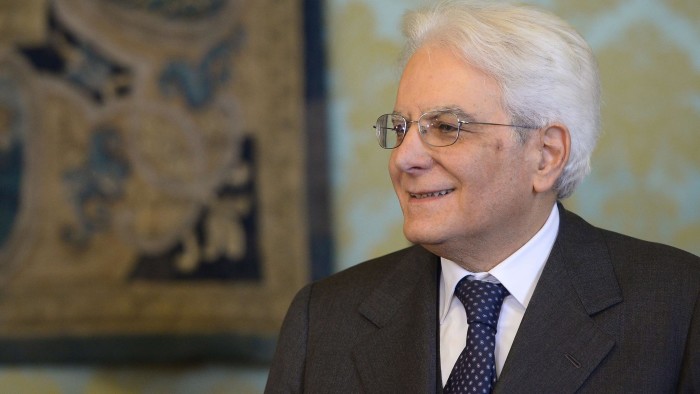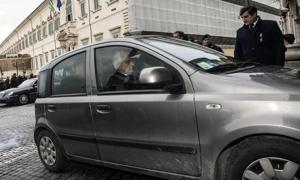Sergio Mattarella: enemy of the Mafia and champion of the law

Roula Khalaf, Editor of the FT, selects her favourite stories in this weekly newsletter.
Sergio Mattarella, the 73-year-old Sicilian judge chosen to be Italy’s new head of state, had few political ambitions early in his professional life — and seemed destined to be a law professor.
But that all changed in early January 1980 when Mafia henchmen strode up to the car of his brother Piersanti, Sicily’s Christian Democratic governor at the time, as he was heading to Mass in Palermo with his family. Piersanti was shot eight times at close range and died in Sergio’s arms on the way to the hospital. From that moment Mr Mattarella began to think about a career in public service — with the goal of fighting the scourge of organised crime.
Mr Mattarella’s reputation as a foe of the Mafia — and a champion of lawfulness — is one of the traits that made him most appealing to Matteo Renzi, Italy’s centre-left prime minister, who launched and aggressively backed his candidacy this week, after intense internal debate within his Democratic party.
Mr Mattarella will replace 89-year-old Giorgio Napolitano, who resigned earlier this month.
At first glance, Mr Mattarella seems like an odd choice for Mr Renzi. Their personalities are vastly different. Whereas Mr Renzi, 40, is youthful, media-savvy, extremely extrovert man with a mission to shake up the Italian political establishment, Mr Mattarella, a constitutional court judge, is the opposite. He is introverted and austere, rarely making public appearances or speaking on television. He represents the legacy of a party, the Christian Democrats, that epitomised the old guard of Italian politics, governing the country for decades until it collapsed more than twenty years ago under a cloud of corruption.
But Mr Renzi and Mr Mattarella share some key traits: both are practising Catholics, and both are centrists.
Politicians and colleagues who know Mr Mattarella well, say his moral integrity makes him the ideal person to play the role of impartial referee of Italian politics, which is often rowdy, tense and gridlocked.
“Though very reserved and generally not a protagonist, he is firm in his convictions,” says Rosy Bindi, who sat in parliament next to him in the early nineties. She notes that despite his Catholic roots, “he is respectful of the secularity of the state”, and in the past clashed with the entrenched and more traditional and inward-looking authorities of the Catholic church.

Although political commentators depict him as a “grey figure” — he travelled around Rome on Saturday in a grey Fiat panda — “he is very courageous in his choices and has strong principles”, says Sergio D’Antoni, MP for the Democrats who has known him for more than 40 years.
“His image betrays his character, of great substance. He is a guarantor for everyone,” adds Mr D’Antoni.
Members of Silvio Berlusconi’s centre-right Forza Italia party did not vote for Mr Mattarella on Saturday yet all speak highly of him despite his far-from-soft criticism of and clashes with Mr Berlusconi.
In 1990, along with other four ministers, Mr Mattarella resigned from his post as education minister when the government passed legislation that favoured the growth of Mr Berlusconi’s media empire. Nine years later, he said it was a “nightmare” that Forza Italia had joined the European People’s Party.
While no one challenges Mr Mattarella’s experience, high institutional profile and capabilities as “guarantor of the constitution” who will encourage the government to pursue with the reform process, some doubt his international experience.
“We needed someone able to communicate with our foreign interlocutors,” says Antonio Martino, a former foreign and defence minister. Mr Mattarella’s only period of international exposure was in the late 1990s when he served as defence minister in Massimo D’Alema’s centre-left government at the time of the Kosovo war.
But most of the commentary on Mr Mattarella’s credentials for the job is upbeat.
“Mr Mattarella will be a president who will be strong on the anti-Mafia values and will keep an eye on the government’s actions. He will not be against the constitutional reforms. He will be able to restore confidence in politics, opening up spaces for change against populism in the society,” says Francesco Clementi, professor of law at Rome’s Luiss University.
According to Enrico Letta, former prime minister, Mr Mattarella “will be an excellent president, a Catholic version of Napolitano and of great authority”.
A widower since 2012, Mr Mattarella has two sons and a daughter, one of whom works with Marianna Madia, minister for public administration.
Comments